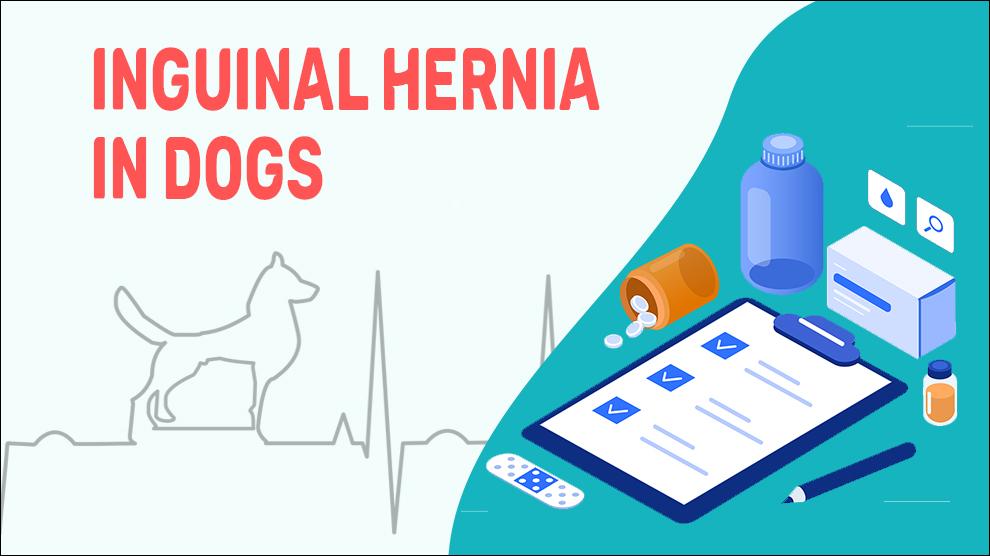Dogs can suffer from hernias, just like humans can.
In veterinary medicine, Hernia is best defined as a defect in the structure that identifies the borders of a body cavity and this ’defect’ may lead to the limited or complete spilling out of the contents of one area into the other.
An inguinal hernia is a condition in which the abdominal contents protrude ("herniate") through a posterior wall of the inguinal canal (direct hernia) or through a persistent opening that does not close during fetal development (indirect or congenital hernia) and moves into the subcutaneous space.
When the gap is big enough, the urinary bladder, the uterus, and/or intestinal contents can become locked or incarcerated which can lead to bowel obstruction and is a life-threatening problem. Therefore, vets recommend closing all hernias after diagnosis. This can be done alongside castration surgery or spaying (ovariohysterectomy).
Exact etiopathogenesis is not yet identified but some of the factors that can lead to an inguinal hernia can be anatomical, hormonal, or metabolic.
Symptoms Of Inguinal Hernia
Uncomplicated inguinal hernia symptoms:
- A small swelling in the groin region(where the hind leg attaches to the body)
- Pain
A complicated inguinal hernia with or without intestinal strangulation symptoms:
- Swelling in the groin area or a hernia sac that is large enough, painful, and bumpy
- Always lying down/ malaise/Depression
- Lack of appetite
- Vomiting
- Pain
- Frequent attempts to urinate
- Bloody urine
Treatment Options For Inguinal Hernia
Surgical Treatment:
Surgery for most pets with inguinal hernias is typically considered a minor procedure. Ventral midline approach is used and hernial sac is opened. After inspection, sac contents are replaced to the abdominal cavity and sac is trimmed at the inguinal ring margins. The hernia ring is sealed with suture material after organ replacement. Abdominal wrap bandage is provided for support.
If the opening is minuscule, some vets do not recommend surgical treatment. However, most defects will widen in due course with abdominal pressures like excess weight, whelping, pregnancy, exercise or trauma.
Enlarged hernias may lead to incarceration and/or strangulation and necrosis of involved tissues, these hernias require surgical intervention.
Home Remedies For Inguinal Hernia
Inguinal Hernias don't go away on their own. Many dog owners are able to holdup surgery for months or even years. For some dogs with small hernia, it may never need surgery.
When the herniation is is small and the dogs don't have any symptoms, or if the symptoms don’t bother the dogs so much, you and your vet may simply continue to watch for symptoms to occur.
Or else, if you are too busy to wait and watch for the symptoms to occur, you can straightaway opt for surgery.
Prevention Of Inguinal Hernia
- Check with your vet if the breed has a history of a hernia and if you see any bulges in the groin area.
- There is no real way to prevent a hernia. Some of the breeds inherit the condition and others acquire it through other health issues. Congenital hernias can be prevented by not breeding pets susceptible to inguinal hernias.
- Pregnancy and obesity are also predisposing factors, it is better to take care of these things in your pets.
- Vets suggest spaying or neutering your dog can have the greatest impact on preventing several types of hernias.
Affected Breeds Of Inguinal Hernia
Pekingese, Basset Hound, Cairn Terrier, Cocker Spaniel, Miniature Pinscher, Lhasa Apso, English Springer Spaniel, Collie, Bull Terrier, Australian Cattle Dog, Pomeranian, Maltese, West Highland Terrier, Basenji, Cavalier King Charles Spaniel
Additional Facts For Inguinal Hernia
Inguinal hernia is of two types
Congenital inguinal hernias:
- More common in male dogs
Acquired inguinal hernia:
- Frequently seen in female dogs
- Causes: old age, chronic cough, pregnancy, increased abdominal pressure other connective tissue problems
Morbidity:
- Inguinal hernias are more common in older dogs
- The occurrence is very rare in neutered male dogs.
Mortality:
- Death from IBDis uncommon.
- Incarcerated hernia or strangulated hernia can cause death
- Elective Surgical repair of an inguinal hernia is usually safe and complications are rare.
Prognosis:
Prognosis depends on the size of herniated organs or other complications associated with hernia. In general, the prognosis is generally good with earlier diagnosis and surgery.
As of now, the only main negative prognostic indicator for inguinal hernia in dogs has been identified as ‘strangulated hernia’. This is life-threatening and has to be addressed immediately.
When To See A Vet
If you see a dog has a strange bulge in its inguinal area, take your dog to your veterinarian for an examination.
Hernias become a medical emergency if the intestine—becomes trapped or incarcerated, and cannot be moved back cutting off its own blood supply. Incarcerated hernias are not a medical emergency but still, they should be treated to prevent strangulation
Strangulation happens when incarcerated organs become ischemic due to compromised blood supply and become necrotic. This is a life-threatening condition and it is a surgical emergency.
Food Suggestions For Inguinal Hernia
- Nutritionally balanced, wholesome diet
- Avoid DRY FOOD and go for a fresh diet
- When opting for Commercial foods, they should have high-quality, natural ingredients, with no artificial additives.
- The raw diet, Semi-Homemade Food (commercial homemade diet with a dehydrated formula) or home-cooked meals
- Protein (required levels of bioavailable protein)
- Fiber-rich foods: Apples, pears, oatmeal, and other foods
Conclusion
In general, inguinal hernias are associated with good prognosis.
With proper treatment, the outlook is good for dogs that even have had a strangulated hernia. The most important thing is to receive treatment as soon as possible.
You may also be able to prevent your dog’s hernia becomes strangulated by being proactive. Seek treatment immediately if you suspect their hernia symptoms are getting bigger.

















